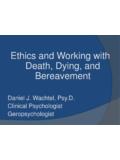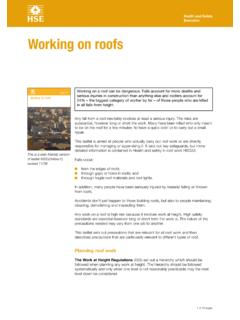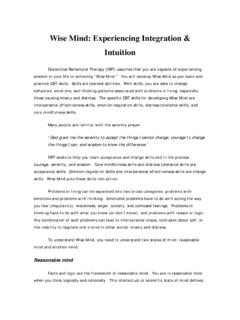Transcription of BRIEFING BARRISTERS: TEN WAYS TO MAKE THE …
1 BRIEFING barristers : ten ways to make THE experience A happier ONEThe relationship between the Bar, and the solicitors branch of the legal profession, isa symbiotic one - barristers and solicitors live off one another. It is obvious thatbarristers live off solicitors, since almost all of our work comes to us from solicitors. What may not be so immediately obvious is that solicitors are also very dependent onthe Bar, particularly - but not solely - in the case of solicitors who practise as is, of course, possible for solicitors to survive in practice without BRIEFING the who practise exclusively in areas like conveyancing have little need of theBar s services.
2 Solicitors have a right of audience in all Queensland courts, and manysolicitors appear as advocates, especially in the Magistrates Courts and in less complexmatters (such as chamber applications) in higher courts. However, attempts by somefirms, in recent years, to establish their own in-house advocacy services, have not beenconspicuously many parts of the Common Law world, the work of barristers and solicitors isperformed by a single profession, such as in the United States and Canada. But inAustralia, separate Bars have survived and prospered. Even in those parts of thecountry where the profession is legally fused - where legal practitioners are admittedas both barristers and solicitors - the great majority of complex litigation is stillconducted by members of independent Bars.
3 That this has occurred is a recognitionof the fact that, by BRIEFING members of an independent Bar, solicitors can add value tothe services which they render to their clients. barristers do this in four ways :(1)First, by providing expertise which the solicitor s firm does not possess. Thisexpertise may relate to a specialised area of the law, such as intellectualproperty, or trade practices, or tax, or town planning. More generally, however,the Bar consists of specialist advocates, and very few solicitors have theopportunity to develop the level of advocacy skills and experience possessed bymost barristers .
4 One of the incidental advantages of our divided profession isthat it allows smaller firms, including suburban and provincial firms, to accessspecialist knowledge and skills which allow them to compete on an equal footingwith big City firms.(2)Secondly, many solicitors find it advantageous to be able to obtain a secondopinion from an independent legal practitioner. As a practical matter, few if anysolicitors will refer a client to another firm unless they can feel completeconfidence that the client will eventually come back. Since barristers do not dealdirectly with members of the public, a solicitor can retain a barrister to provide aclient with specialist advice, without any fear that the client will be poached.
5 (3)Thirdly, barristers can provide a very cost-effective service. The nature ofpractise as a solicitor demands a fairly high level of infrastructure - I understandthat, for many firms, 75 or 80 cents out of every dollar billed to clients goes instaff wages and other overheads. barristers , by contrast, operate with2reasonably low overhead and infrastructure costs. This means that barristers ,and especially more junior barristers , can provide their services at a muchcheaper daily or hourly rate than solicitors of equivalent standing. (4)Fourthly, even if a case does not involve a particular area of legal specialisation,very few solicitors can obtain the amount of experience which most barristershave as in-court advocates.
6 Of course, this is particularly relevant where abarrister is briefed to appear in court. But it is also relevant in other ways - forexample, where a barrister is briefed to provide an opinion. The ultimate test ofthe correctness of any legal proposition is whether it will stand up in court. Andit is difficult to assess whether a legal proposition will stand up in court, unlessone has hands on experience of conducting cases in court. The object of this morning s paper is to identify a number of considerations which willassist in making the experience of BRIEFING counsel a happier one on both sides.
7 I willsay, immediately, that my motives are not entirely altruistic. It is as much for the Bar sbenefit, as for the benefit of solicitors, that the relationship is a mutually satisfactory detailed guidance on this subject can be obtained from my paper, PreparingBriefs Made Simple , which was published in the Queensland Law Society Journal, June1991, volume 21, , commencing at What appears here is really only asummary of what is contained in that article, updated in a few minor respects. 1. Select Counsel Appropriate for the TaskMany firms have a regular stable of counsel whom they usually brief.
8 You may findthat your firm ordinarily uses a particular barrister for personal injuries matters, aparticular barrister for criminal matters, or a particular barrister for commercial your firm has a good working relationship with a particular barrister, that is a very goodreason to use the barrister in any matter falling within the range of the barrister sexperience or what happens when your firm s preferred barrister is not available, or a matterarises which falls outside that barrister s experience or expertise ? Or it may simply bethe case that, because your firm does not do a lot of litigation, the firm does not havean established relationship with any member of the Bar.
9 When choosing barristers ,three factors should be taken into account: seniority, specialisation and experience . It is as much a mistake to brief a counsel who is too senior, as it is to brief a counselwho is too junior. On the one hand, the barrister whom you normally use for crash andbash cases in the Magistrates Court may be somewhat out of his or her depth in a HighCourt appeal. The barrister may be flattered by the offer of such a brief, but you will notbe doing any favours, either to the barrister concerned, or (more importantly) to the other hand, seniority normally carries with it a higher price tag.
10 Fee structureswithin the Bar are probably more variable than those of any other profession, ranging3from junior barristers who may charge as little as a few hundred dollars per day, up tothe top QCs at the Sydney bar who reportedly charge as much as $12, per client will not thank you for BRIEFING even a Brisbane QC - whose fees are muchmore reasonable than their Sydney counterparts - to do a case which could easily behandled by an experienced junior. Specialisation and experience are separate but related concepts. A barrister mayspecialise in a particular branch of the law - say, personal injuries matters, or familycourt matters, or criminal matters, or local government matters - or perhaps somethingmore esoteric, like intellectual property matters, or tax matters.






